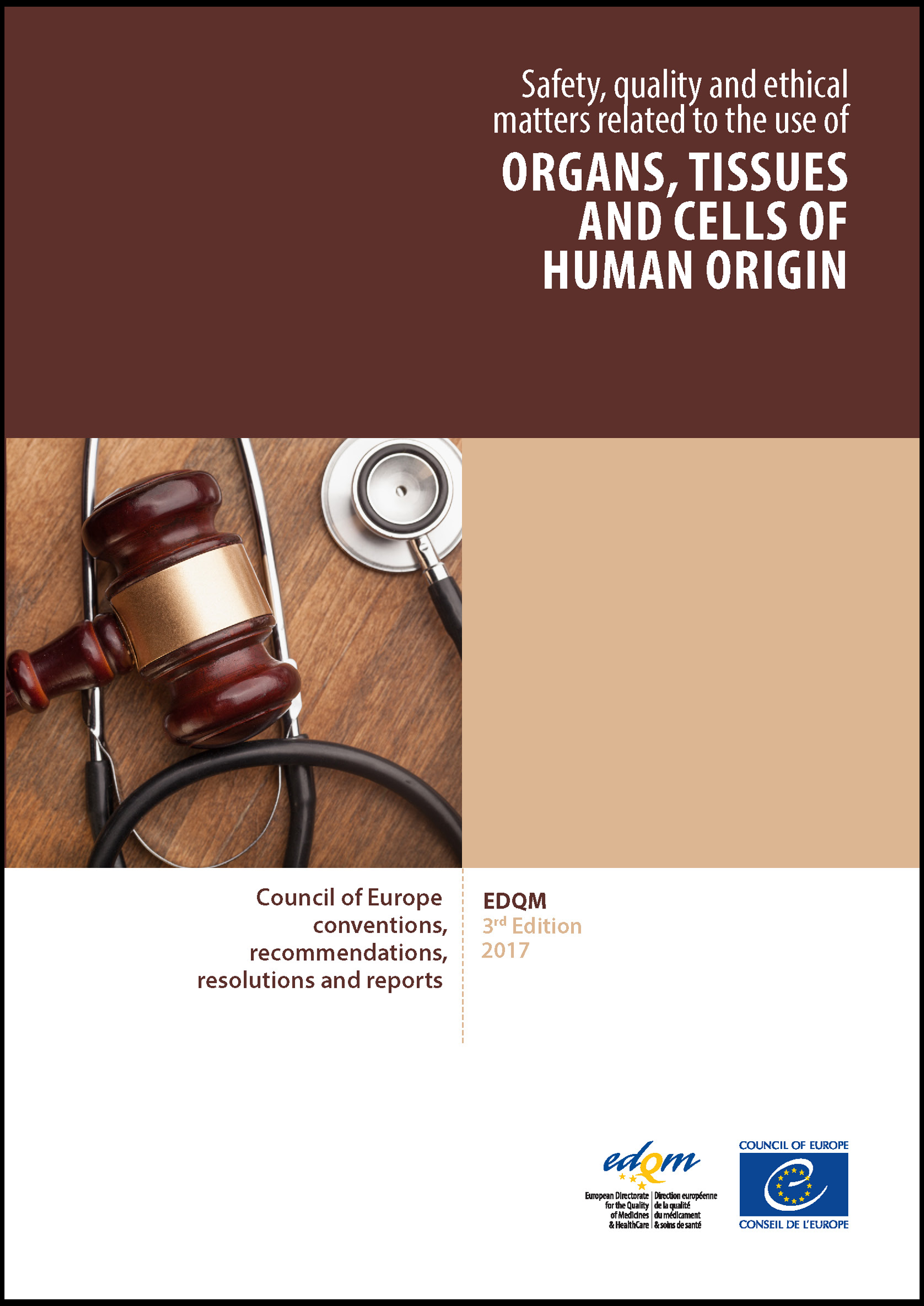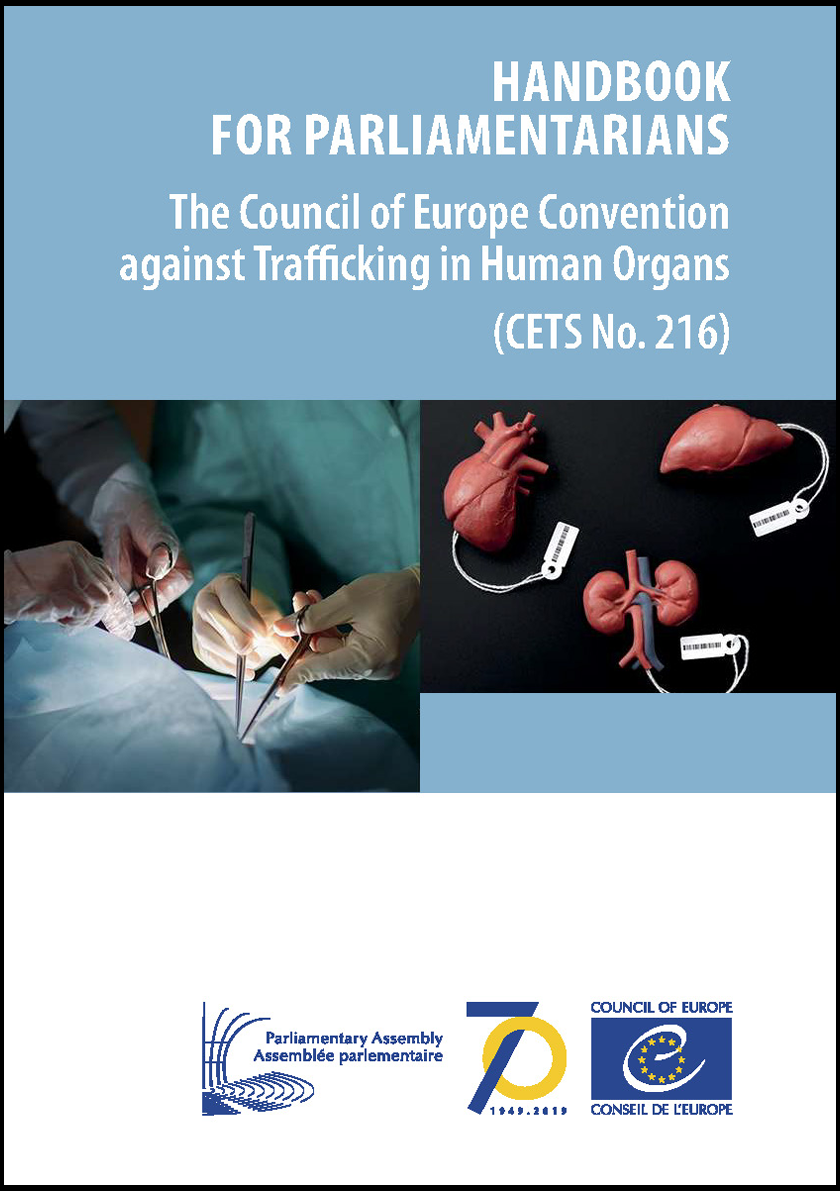Legal Framework
Council of Europe legal framework
Within the framework principle of sharing knowledge through international co-operation, the Council of Europe and the CD-P-TO and its predecessors have established widely-recognised recommendations and resolutions in the field of transplantation covering ethical, social, scientific and training aspects of organ, tissue and cell donation and transplantation.
Whereas Agreements and Conventions are binding on the states that ratify them, resolutions and recommendations are policy statements proposing a common course of action to governments that they can follow.
Agreements and Conventions
- The Convention against Trafficking in Human Organs and its Explanatory Report, opened for signature on 25 March 2015 in Santiago de Compostela, identifies distinct activities that constitute “trafficking in human organs”. The central concept is “the illicit removal of organs”, which consists of removal without the free, informed, and specific consent of a living donor; removal from a deceased donor other than as authorised under domestic law; removal when a living donor (or a third party) has been offered or received a financial gain or comparable advantage; or removal from a deceased donor when a third party has been offered or received a financial gain or comparable advantage.
See also: Signatures and ratifications - The Convention on action against trafficking in human beings and its Explanatory Report (European Treaty Series, No. 197), opened for signature in Warsaw on 16 May 2005, which entered into force on 1 February 2008, addresses the trafficking of human beings, including for the purpose of organ removal.
- Additional Protocol to the Convention on Human Rights and Biomedicine Concerning Transplantation of Organs and Tissues of Human Origin (European Treaty Series #186), opened for signature on 24 January 2002 in Strasbourg and entered into force on 01 May 2006. This Additional Protocol aims to protect the dignity and identity of everyone and guarantee, without discrimination, respect for his or her integrity and other rights and fundamental freedoms with regard to transplantation of organs and tissues of human origin.
- Oviedo Convention: Protection of Human Rights and Dignity of the Human Being with Regard to the Application of Biology and Medicine (European Treaty Series #164), signed on 04 April 1997 and entered into force on 01 December 1999, is the first legally-binding international text designed to preserve human dignity, rights and freedoms through a series of principles and prohibitions against the misuse of biological and medical advances.
- European Agreement on the Exchange of Therapeutic Substances of Human Origin (European Treaty Series #026), signed in Paris on 15 December 1958, aims to provide mutual assistance in respect of the supply of therapeutic substances of human origin.
- Convention for the Protection of Human Rights and Fundamental Freedoms (European Treaty Series #005), is an international treaty to protect human rights and fundamental freedoms in Europe. It was drafted in 1950 by the then newly formed Council of Europe and entered into force on 03 September 1953.
Recommendations
- Recommendation CM/Rec(2024)8 on the family approach to discuss deceased organ and tissue donation
- Recommendation CM/Rec(2023)7 of the Committee of Ministers to member States on establishing national harmonised organ transplant registries with a view to facilitating international data sharing
- Recommendation CM/Rec(2022)19 of the Committee of Ministers to member States on establishing measures for the harmonised collection of activity data related to the availability and use of tissues and cells of human origin with a view to supporting self-sufficiency and facilitating international data sharing
- Recommendation CM/Rec(2022)3 of the Committee of Ministers to member States on the development and optimisation of programmes for the donation of organs after the circulatory determination of death
- Recommendation CM/Rec(2020)6 on establishing harmonised measures for the protection of haematopoietic progenitor cell donors
- Recommendation CM/Rec(2020)4 on the quality and safety of organs for transplantation
- Recommendation CM/Rec(2020)5 on the quality and safety of tissues and cells for human application
- Recommendation No (2006) 16 of the Committee of Ministers to member states on quality improvement programmes for organ donation
- Recommendation No (2006) 15 of the Committee of Ministers to member states on the background, functions and responsibilities of a National Transplant Organisation (NTO)
- Recommendation No (2005) 11 of the Committee of Ministers to member states on the role and training of professionals responsible for organ donation (transplant “donor co-ordinators”)
- Recommendation No (2004) 19 of the Committee of Ministers to member states on criteria for the authorisation of organ transplantation facilities
- Recommendation No (2004) 8 of the Committee of Ministers to member states on autologous cord blood banks and its explanatory memorandum
- Recommendation No (2004) 7 of the Committee of Ministers to member states on organ trafficking
- Recommendation 1611 (2003) on Trafficking in organs in Europe
- Recommendation No (2003) 12 of the Committee of Ministers to member states on organ donor registers
- Recommendation No (2003) 10 of the Committee of Ministers to member states on xenotransplantation and its explanatory memorandum
- Recommendation No (2001) 5 of the Committee of Ministers to member states on the management of organ transplant waiting lists
- Recommendation No (98) 2 of the Committee of Ministers to member states on provision of haematopoietic progenitor cells
- Recommendation No (97) 16 of the Committee of Ministers to member states on liver transplantation from living related donors
- Recommendation No (97) 15 of the Committee of Ministers to member states on xenotransplantation
- Recommendation No (94) 1 of the Committee of Ministers to member states on human tissue banks
Resolutions
- Resolution CM/Res(2017)2 on establishing procedures for the management of patients having received an organ transplant abroad upon return to their home country to receive follow-up care
- Resolution CM/Res(2017)1 on principles for the selection, evaluation, donation and follow-up of the non-resident living organ donors
- Resolution CM/Res(2015)11 on establishing harmonised national living donor registries with a view to facilitating international data sharing and its Explanatory Memorandum
- Resolution CM/Res(2015)10 on the role and training of critical care professionals in deceased donation
- Resolution CM/Res(2013)56 on the development and optimisation of live kidney donation programmes and its Explanatory memorandum
- Resolution CM/Res(2013)55 on establishing procedures for the collection and dissemination of data on transplantation activities outside a domestic transplantation system
- Resolution CM/Res(2008)6 on transplantation of kidneys from living donors who are not genetically related to the recipient
- Resolution CM/Res(2008)4 on adult-to-adult living donor liver transplantation
- Resolution CM/Res(78) 29 on harmonisation of legislations of member states relating to removal, grafting and transplantation of human substances
European Union regulatory framework
Organs
- Directive 2012/25/EU on laying down information procedures for the exchange, between Member States, of human organs intended for transplantation
- Directive 2010/53/EU on standards of quality and safety of human organs intended for transplantation
Tissues and cells
- Directive 2015/565 amending Directive 2006/86/EC as regards certain technical requirements for the coding of human tissues and cells
- Directive 2015/566 implementing Directive 2004/23/EC as regards the procedures for verifying the equivalent standards of quality and safety of imported tissues and cells
- Directive 2012/39/EU amending Directive 2006/17/EU as regards certain technical requirements for the testing of human tissues and cells
- Directive 2006/86/EC on traceability requirements, notification of serious adverse reactions and events and certain technical requirements for the coding, processing, preservation, storage and distribution of human tissues and cells
- Directive 2006/17/EC on technical requirements for the donation, procurement and testing of human tissues and cells
- Directive 2004/23/EC on setting standards of quality and safety for the donation, procurement, testing, processing, preservation, storage and distribution of human tissues and cells
Other relevant legislation
- Regulation (EC) No. 1394/2007 on advanced therapy medicinal products
UN/WHO guidance documents
- United Nations Resolution 75/195: Strengthening and promoting effective measures and international cooperation on organ donation and transplantation to prevent and combat trafficking in persons for the purpose of organ removal and trafficking in human organs
- United Nations Resolution 77/236: Strengthening and promoting effective measures and international cooperation on organ donation and transplantation to prevent and combat trafficking in persons for the purpose of organ removal and trafficking in human organs
- Global Observatory on Donation & Transplantation (GODT)
- United Nations Resolution 71/322: Strengthening and promoting effective measures and international cooperation on organ donation and transplantation to prevent and combat trafficking in persons for the purpose of organ removal and trafficking in human organs
- United Nations Resolution 73/189: Strengthening and promoting effective measures and international cooperation on organ donation and transplantation to prevent and combat trafficking in persons for the purpose of organ removal and trafficking in human organs
- 63rd World Health Assembly, Resolution WHA63.22 on human organ and tissue transplantation
- WHO guiding principles on human cell, tissue and organ transplantation, as endorsed by the 63rd WHA, May 2010, Resolution WHA63.22
- Third WHO Global Consultation Executive Summary
- Third WHO Global Consultation Note from the Secretariat
- Aide - Mémoire on key safety requirements for essential minimally processed human cells and tissues for transplantation
- Aide-Memoire: Access to safe and effective cells and tissues for transplantation
- Global Glossary
Additional Guidance
- The Declaration of Istanbul on Organ Trafficking and Transplant Tourism
- Madrid Resolution on organ Donation and Transplantation
- Report of the Madrid Consultation Part 1
- Part 2: Reports From the Working Groups
- Barcelona Principles on the use of human donated tissue for ocular transplantation, research, and future technologies
- WMA Statement on Measures for the Prevention and Fight against Transplant-Related Crimes
Relevant Publications
Signatures & ratifications








